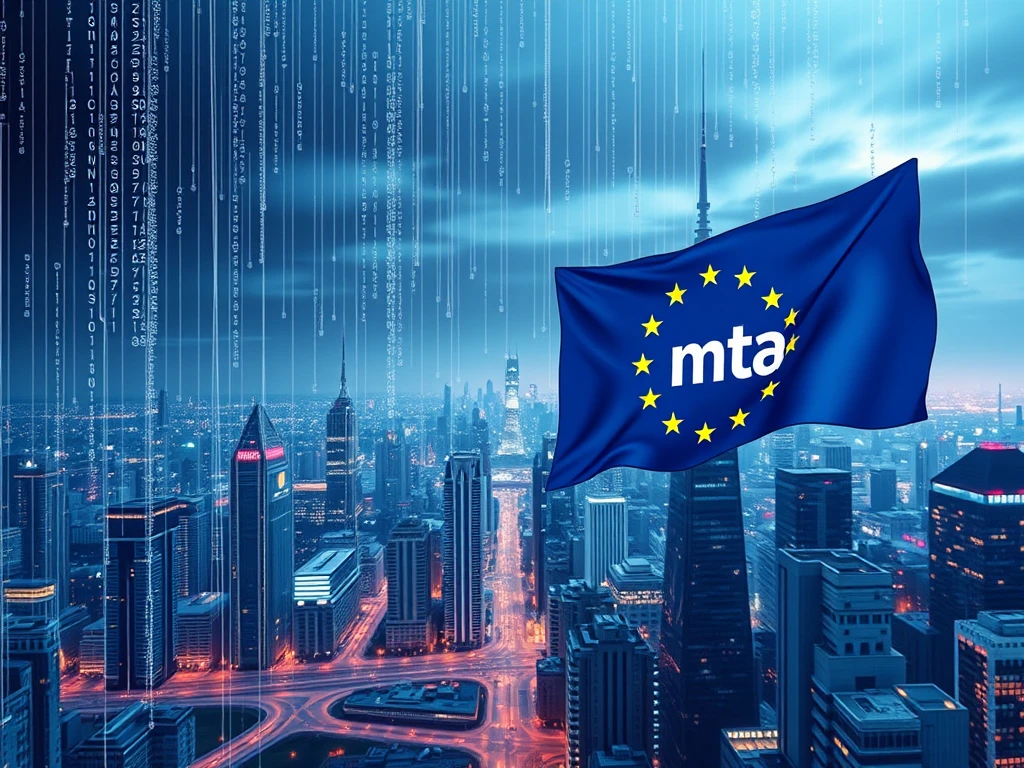Meta’s Bold AI Move: EU Greenlights Social Media Data Training

In a significant development for the tech world, Meta has received the green light from European Union regulators to leverage social media content for training its artificial intelligence (AI) models. This decision marks a pivotal moment in the ongoing debate about data privacy and AI development, especially within the cryptocurrency and blockchain space, where data security is paramount. Let’s dive into what this groundbreaking approval means for users and the future of AI.
EU Regulator Approves Meta AI Training on Social Media Content
The European Data Protection Commission (EDPC), the EU’s data watchdog, has given Meta the go-ahead to utilize publicly shared content from its vast social media platforms for Meta AI training. This includes posts and information from adult users across Facebook, Instagram, WhatsApp, and Messenger. Even queries directed to Meta’s AI assistant will contribute to refining its AI models. This is a massive leap forward for Meta, as explained in their blog post on April 14.
Meta emphasizes the importance of this decision for creating more nuanced and effective AI. According to the tech giant, training AI on diverse data, especially from European users, is crucial. This approach aims to enable AI to better understand:
- Dialects and colloquialisms
- Hyper-local knowledge
- Cultural nuances in humor and sarcasm across different European countries
By incorporating this wide range of data, Meta aims to develop AI models that are more culturally aware and contextually relevant for European users.
Safeguarding User Privacy: What’s Off-Limits?
While this approval is a win for Meta’s AI ambitions, it comes with crucial caveats regarding user privacy. Data privacy remains a top concern, and Meta has explicitly stated that certain types of data are strictly excluded from social media content used for AI training:
- Private messages exchanged with friends and family.
- Public data from account holders under the age of 18 in the EU.
Furthermore, Meta is offering an opt-out mechanism for users who do not want their data to be used for AI training. This opt-out option will be accessible through in-app notifications, email communications, and easily discoverable forms. This measure aims to empower users with control over their data and align with European data protection standards.
Navigating Regulatory Hurdles: The Path to Approval
The journey to this approval wasn’t without its bumps. Last July, Meta had to pause its AI training plans in Europe following complaints from the privacy advocacy group None of Your Business (noyb). These complaints, filed across 11 European countries, raised concerns about Meta’s privacy policy changes, which critics feared would allow the company to exploit years of personal posts, private images, and online tracking data for AI development.
The Irish Data Protection Commission (IDPC) intervened, requesting a pause to conduct a thorough review. However, Meta has now confirmed that the EDPC has assessed its AI training approach and deemed it compliant with legal obligations. Meta stated that they are engaging “constructively with the IDPC” and that this approach mirrors their AI training practices in other regions since launch.
Meta also points out that they are following the precedent set by industry giants like Google and OpenAI, both of whom have already utilized data from European users for their own AI models.
Industry-Wide Scrutiny: A New Era of AI Regulation
Meta isn’t the only tech giant facing regulatory scrutiny over AI and data usage. Other companies in the tech space have also encountered similar challenges in the EU:
- Google: An Irish data regulator launched a cross-border investigation into Google Ireland Limited in September 2023 to examine their compliance with EU data protection laws during AI model development.
- X (formerly Twitter): X agreed to halt the use of personal data from EU and European Economic Area users for AI training in September 2023. Previously, this data fueled the development of their AI chatbot, Grok.
These instances highlight a growing trend of regulatory oversight in the AI sector, particularly in the EU. The EU’s AI Act, launched in August 2024, further solidifies this trend by establishing a comprehensive legal framework for AI technology, encompassing data quality, security, and privacy provisions. This act signals a new era of responsible AI development in Europe.
Implications and Future Outlook
Meta’s successful navigation of EU regulations to train AI models on social media content sets a significant precedent. It demonstrates that with careful consideration of data privacy and proactive engagement with regulators, tech companies can leverage vast datasets for AI advancement within the EU’s legal framework. However, the emphasis on user opt-out and the ongoing scrutiny of other tech firms indicate that data privacy will remain a central theme in the evolving landscape of AI regulation.
For cryptocurrency and blockchain enthusiasts, this development underscores the importance of data security and regulatory compliance in the tech world. As AI becomes increasingly integrated into various sectors, including the crypto space, understanding and respecting data privacy regulations will be crucial for fostering trust and ensuring responsible innovation.
In conclusion, Meta’s EU approval is a landmark decision that balances AI innovation with data protection. It paves the way for more sophisticated and culturally relevant AI models while reinforcing the importance of user privacy and regulatory oversight in the digital age. This is a space to watch closely as AI continues to evolve and reshape our world.








